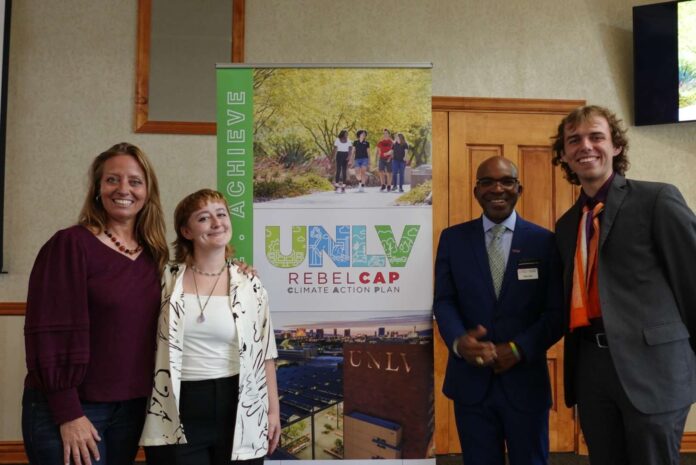
UNLV announced its official climate action plan with Rebel CAP at its kick-off event in the Foundation Building on Sept. 14.
Sustainability Coordinator Tara Pike, one of the core team members, stated that Rebel CAP is an explicit roadmap to how UNLV will reduce its carbon emissions. Musa Pam, another core team member, aims for UNLV to be climate neutral by 2057, UNLV’s 100th anniversary. This means that UNLV will offset harmful greenhouse gasses by implementing climate-friendly actions to absorb them, like planting trees and making sure future buildings are built to reduce energy use.
This plan is a result of former College of Liberal Arts Senator Zachary Billot’s CSUN Senate Resolution 32-365, which passed in September 2022. The resolution urged UNLV to create a comprehensive climate plan to address its carbon footprint and be transparent about tracking their climate impact. Part of being more transparent is participating in the Sustainability Tracking Assessment and Rating System (STARS). After passing the legislation, Billot recalls chasing down UNLV President Keith Whitfield to rally support for the climate plan.
“UNLV is behind compared to other universities and other NSHE institutions when it comes to environmental sustainability,” said Pike. “There have been sustainability efforts but this gives us a chance to do better and prioritize having a direction.”
The plan officially started in March 2023 and will be implemented in March 2024 in three phases: information gathering, plan development and plan socialization/finalization. Those who are a part of Rebel CAP will be split into working groups. Working groups will address different aspects of the plan, including building and energy, waste management, sustainable transportation, water resource management, stewardship and climate justice, academic research, and green procurement and policies.
UNLV is setting up the climate action plan in collaboration with Brailsford & Dunlavey, a program management firm based in Washington, D.C.
Pike mentioned that UNLV has been very focused on social sustainability—social justice and repairing social wrongs—for a long time but hasn’t focused too much on environmental sustainability. Rebel CAP will focus on the environmental aspect of sustainability. She believes that social, environmental and economic factors all come together to form true sustainability.
“Our plan also takes climate justice into account,” said Pam. “We’re not gonna build harmful stuff right next to low-income communities and contribute to environmental racism.”
According to the National Resources Defense Council, environmental racism refers to how people of color and low-income populations are disproportionately affected by environmental pollution because of hazardous facilities nearby.
When asked about the roles within the four members of the core team, Pike said that they truly work as a team with no real distinction between them. The core team is made up of two staff members, Tara Pike and Musa Pam, and two undergraduate students, Zachary Billot and Andie Davis.
“Things only happen because of students,” said Pam.
Pike stressed his point and said that students hold all the power. With enough of them saying they want something to happen, it will happen.
“It’s not about saving the earth. It’s about saving the earthlings,” said Pike.Students can find more information about Rebel CAP at their website, https://www.unlv.edu/facilities/sustainabilitsy/rebelcap.
